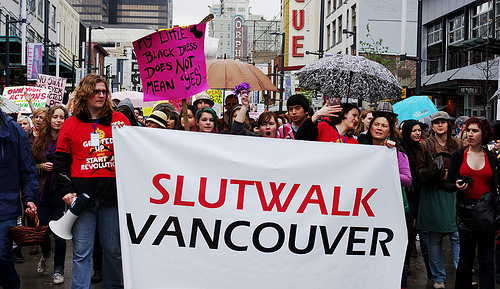Date Posted: June 2, 2011
Print Edition: May 27, 2011
By Joel Smart (The Cascade) – Email
 No means no. It’s never the victim’s fault when they are assaulted, and it’s about time our society learned to stop sex-shaming and victim-blaming. This was the message of Slutwalk, which first took place in Toronto, and has since spread across the country and across the globe. It all began as a reaction to Michael Sanguinetti, a police constable in Toronto, who told students at York University that women could avoid sexual assault by not dressing like “sluts.” Slutwalk Vancouver took place on May 15, and was a resounding success, but it also showcased the trouble facing the increasingly-fragmented feminist movement, as it struggled to agree on what exactly the march was seeking to accomplish.
No means no. It’s never the victim’s fault when they are assaulted, and it’s about time our society learned to stop sex-shaming and victim-blaming. This was the message of Slutwalk, which first took place in Toronto, and has since spread across the country and across the globe. It all began as a reaction to Michael Sanguinetti, a police constable in Toronto, who told students at York University that women could avoid sexual assault by not dressing like “sluts.” Slutwalk Vancouver took place on May 15, and was a resounding success, but it also showcased the trouble facing the increasingly-fragmented feminist movement, as it struggled to agree on what exactly the march was seeking to accomplish.
The real purpose of the Slutwalk was simply to say that it’s not okay to suggest that the way someone dresses makes them in any way responsible for being taken advantage of. It’s not fair to pin assault on the group of people already targeted by criminals. Although the comments by the police officer were strictly about women, it was easy to see how they could relate to an issue like homosexuality. He might have said that gays could avoid being assaulted if they were to just act straight in public. When we put any blame on the victim, we’re actually taking blame away from the person who committed the crime. Although, as CBC reported, the officer apologized for his comments, his words echoed the beliefs of many people, and Slutwalk was about setting the record straight: victim blaming is not okay.
The insult “slut” is an incredibly troubling one, which can be used to put down a woman for just about any reason – something girls in middle school learned years ago. While the term is most specifically used to refer to a woman who has sex with a lot of partners, it has evolved into meaning a woman who is sexual (and therefore trashy), as though any female with a sex drive is somehow worth less. For such a harmful word, it’s chilling how commonly it is still used.
When the official Slutwalk Twitter decided it was going to “reclaim” the word slut, it began a barrage of infighting among feminists over whether the Slutwalk was helping or harming the progress of women. Kirsten Powers wrote in the New York Post that she was appalled by the sentiment, and said, “let’s not pretend that women holding ‘slut walks’ is a step forward for womankind or will in any way change the treatment of rape victims.”
Although I agree with Powers that taking the negative power away from the word slut is unlikely, I think it was a shame that this became the focal point of the march for so many people. The real purpose of the event was hidden by the ferocious debate by feminists on either side of the “reclaiming” issue.
Thankfully, the march itself drew an enormous crowd, and the speakers at the event did not mention the controversial side of the issue – instead focusing on the importance of consent, and the worth of an individual no matter what they wear. As far as I’m concerned, we need to stop using the word slut altogether, because it comes from a bad place that we would be best to leave in the past. Additionally, we need to realize that even if you go outside naked, no one has the right to rape you, and putting blame on the victim will only serve to keep future victims quiet and ashamed. I hope to see the Slutwalk again next year, and maybe next time we can get the different feminist groups on the same page, and ultimately create far more positive change together.


